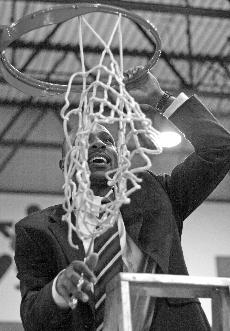By now, most of Loyola is aware of the blockbuster season the women’s basketball team had. They’ve heard about GCAC Player and Freshman of the Year Trenese Smith and coach of the year Dobee Plaisance.
Most of them, however, do not know Alton Clivens.
Alton Clivens has been Loyola’s assistant women’s basketball coach for the last four years. A native of New Orleans, Clivens attended Brother Martin High School and later graduated from Texas A&M with a degree in management information systems.
Since his joining the women’s coaching staff, the Wolfpack has had two 21-win seasons and qualified for two NAIA National Tournaments: in 2004-05 and this year. Clivens attends every practice throughout the year and every game, home or away. He is not affiliated with Loyola as an employee and does not receive a salary.
For the past six years, he has also been the coordinator of Program Services for Xavier University’s Upward Bound Program, which assists low-income and first-generation high school students in pursuing postsecondary education.
While he must juggle two full-time positions at Xavier and Loyola – bitter cross-town rivals, ironically – the team has practice at 6 a.m. to help accommodate for Clivens’ work schedule.
“I use almost all of my earned vacation hours during the season in order to be able to coach,” Clivens said. “My job is year-round, so I hardly ever get any free time because I am always working, coaching or both.”
PRACTICAL VOLUNTEERS
Although none of the assistant coach positions for either the women’s or men’s basketball teams is salaried, Clivens has been paid a stipend for the last two years of his tenure with the university. He and the two assistant coaches for the men’s basketball team work on a volunteer basis and receive money raised by the head coach.
“I think that assistant coaches deserve a salary, because they are doing a job and a service to the university,” Clivens said. “These duties serve no less importance because of pay or lack there of.”
Clivens believes the administration has been taking the necessary steps toward improving Loyola’s athletics program. But like anything else, its success is largely dependent on its funding.
“I think Loyola’s (athletic) budget is very insufficient,” Clivens said.
Since the instatement of athletic scholarships, the women’s teams has earned a conference title, two national NAIA tournament bids and NAIA Scholar All-American and All-Conference players.
Scholarships, however, are only one aspect of a successful athletics program. As compared with other schools in its conference, Clivens feels that Loyola’s lack of financial resources puts the teams at a disadvantage.
“If every sport had scholarships, proper budgeting and paid assistants, results would improve. The university should continue its enhanced support of athletics, and a big part of that is by providing the adequate resources and money for the athletic programs,” Clivens said.
A NEW GAME PLAN
According to associate provost Marcia Petty, the administration is responding to the complaints expressed by Clivens. The administration maintains that the athletic budget is prioritized in relation to specific needs and available funds.
“Dr. (Michael) Giorlando … is researching ways in which assistant coaches can be hired,” Petty said. Petty confirmed that next year the department will hire a new assistant director of Athletics and Recreation who will have coaching responsibilities.
“The Rec Center was not designed with athletics in mind,” Giorlando said. “We are aware of locker room shortage for several of our teams and are looking forward to a space study for the entire facility. This will give us the information we need to pursue making the correct improvements for all our programs.”
Giorlando and the athletics departments have long been aware of the space shortage. By working with the recreational department, their goal is to use space in the Rec Plex’s racquetball rooms and conference room. Katrina has also pushed back the department’s continuing efforts to expand their facilities.
“We have to look at a three- to five-year plan to raise the money and get to the blueprint stage,” Giorlando said. “We would also like to have permanent seating to be used for both athletic events and student-affair events.”
Funding for these improvements will come from both the administration and supplemental money raised by each coach. In time, more resources will lead to greater success in the future of the program and offer more to the school at large.
“The women’s basketball team is a shining example of the positive effect that a sport can have on a university and a community,” Clivens said. “This effect could be more widespread with the improvement of athletic programs.”
For Clivens and the other assistant coaches, a salary won’t create more free hours in their schedule, but it will help establish a stronger program and a larger, more capable coaching staff for future years.
“I do this for (Coach Plaisance) and my team,” Clivens said. “They all are an irreplaceable part of my life. They help keep me grounded, and it’s a joy just to be a part of such a great group of people.”
Nicole Mundy can be reached at nlmundy@loyno.edu.

Alton Clivens, assistant women’s basketball coach, discuesses stratey with fellos assistant Rachel Kovach. (Steve Kashishian)






